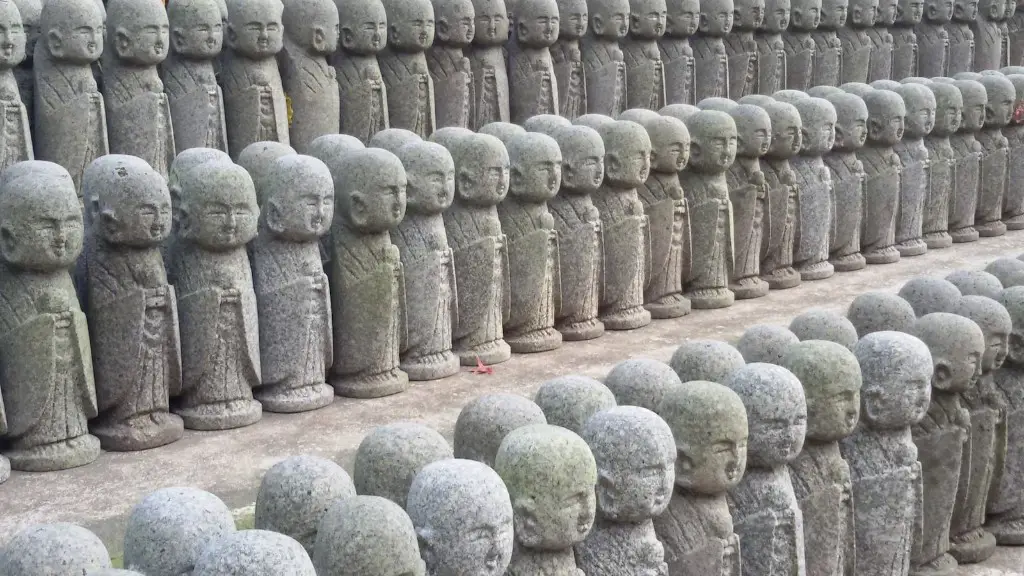Hinduism is one of the oldest and most fascinating religions of the world. It is extremely complex and offers its followers a unique set of beliefs and practices. There are a number of unique characteristics that define Hinduism and set it apart from other popular religions.
To begin with, Hinduism does not have a founder as such. It is a way of life that has been passed down from generation to generation and it has been evolving over time. It is an amalgamation of various ancient beliefs that were traditionally practiced in India.
Another unique characteristic of Hinduism is that it is polytheistic. Hindus worship a variety of gods and goddesses, each with their own purpose. Devotees often form strong attachments to particular gods, and many rituals are focused around them.
Unlike other religions, Hinduism does not have a single holy book. There are a number of sacred texts, including the Bhagavad Gita and the Upanishads, that are considered authoritative. However, there is no one book that is considered the absolute divine truth.
Hinduism is also distinct in its acceptance of all paths. Hindus believe that all paths lead to the divine and that the ultimate truth can be found in any spiritual practice, even if it is not explicitly a part of Hinduism.
Finally, Hinduism does not require conversion. It is an open religion, and anyone is free to practice it without having to officially join it. This openness makes it an attractive option for many seekers of spiritual truth.
Rituals and Traditions
The rituals and traditions of Hinduism vary greatly from one part of India to another. There are a range of different practices, such as meditation, pilgrimage, and temple worship. There are also a range of festivals that celebrate the gods and Goddesses.
The most well-known of these is Diwali, the festival of lights. This is usually celebrated by lighting diyas (oil lamps) and setting off fireworks. It is a time of thanksgiving and joy, and Hindus believe it brings good luck and prosperity.
The festival of Holi is another important Hindu festival. It is celebrated primarily in North India and marks the onset of spring. People splash each other with colored powders, and traditionally it was also customary to fast on this day.
In addition to these festivals, Hindus also celebrate a number of important life-cycle rituals. These rituals are meant to mark important events such as birth, marriage, and death.
These rituals are often accompanied by offerings and prayers to the gods and goddesses. For example, a baby’s birth is celebrated by offering a special puja (ceremony of worship) to Lord Ganesha, the god of obstacles.
Vedic Philosophy
Hinduism is based on the principles of Vedic philosophy. The Vedas are a collection of texts that contain the core tenets of Hinduism. They focus on metaphysical questions such as the nature of self and the relationship between individual souls and the divine.
Vedic philosophy also emphasizes the idea of karma. This is the idea that one’s actions have spiritual consequences, and that the universe is in a state of constant balance. The actions of one’s past lives will have an effect on one’s future lives, and it is important to remain mindful and strive for balance.
Vedic philosophy also emphasizes the idea of reincarnation. Hindus believe that after death, one’s soul is reborn in another body. This allows the soul to accumulate experiences and gain spiritual insight as it moves through different lives.
Finally, Vedic philosophy posits that all individuals are part of the divine. There is no separation between the soul and the divine, and individuals can experience union with the divine. This union is known as moksha and it is the ultimate goal of Hinduism.
Karma and Dharma
Karma and Dharma are two important ideas in Hinduism. Karma can be understood as cause and effect, or the idea that your actions have spiritual consequences. Dharma, on the other hand, can be understood as a code of conduct. Hindus are expected to live in accordance with the laws of Dharma, which involve righteousness, morality, and justice. Good karma is acquired by living in accordance with Dharma.
Karma and Dharma are integral parts of Hindu philosophy. Together, they emphasize the idea that individuals are responsible for their own actions and must strive to maintain a sense of balance in the universe. They show that Hinduism is not simply a system of beliefs, but a way of life that one must strive to uphold.
Karma and Dharma are understood differently in different branches of Hinduism, and in some branches, they have been heavily influenced by Buddhism. However, the core principles remain the same – that individuals have a responsibility to live in harmony with the laws of the universe.
Caste System
The caste system is an important part of Hinduism and is a system of social hierarchy. It is based on the idea that each individual is born into a particular caste and will remain in this caste for their entire life. This system has been in existence for thousands of years, and it continues to have a profound effect on many aspects of Hindu life.
The caste system is based on the belief that each individual has a unique set of responsibilities and duties in life. Each caste is responsible for fulfilling a certain role in society, and Hindus believe that if each caste does its job properly, then society will be in balance.
The caste system is highly controversial, and it has been criticized for fostering inequality and discrimination. However, it is important to recognize that it is still a fundamental part of Hinduism and has strong cultural and spiritual roots.
The caste system is an important part of Hindu culture and it is intimately connected to Hindu philosophy and way of life. While there is much debate about its fairness, it still plays an important role in the Hindu worldview.
Yoga and Ayurveda
Yoga and Ayurveda are two important aspects of Hinduism. Yoga is a system of physical, mental, and spiritual practices that originated in India. It is designed to promote physical and mental wellbeing, and it can be helpful in overcoming stress and illness.
Ayurveda is a system of traditional medicine that originated in India. It is based on the idea that health depends on a balance between the body, mind, and spirit. Ayurveda focuses on natural treatments such as herbs and special diets.
Yoga and Ayurveda have become increasingly popular in recent years and are now practiced around the world. They are still very much a part of Hinduism, and believers view them as spiritual practices that help one to reach enlightenment.
Yoga and Ayurveda are two important aspects of Hinduism and they represent the holistic approach that Hindus take to health and wellbeing. Along with traditional rituals and philosophical principles, they are integral to the Hindu way of life.
Conclusion
Hinduism is a complex, ancient religion that is unique in many ways. It does not have a founder or single holy book, and it is open to all paths that lead to the divine. It is based on the principles of Vedic philosophy and it emphasizes karma, dharma, and caste. Rituals and festivals such as Diwali and Holi are important aspects of Hindu life, as are Yoga and Ayurveda.
Hinduism offers its followers a wide range of spiritual experiences and insights. It encourages them to develop a connection with the divine and to strive for balance and harmony in their lives. It is a rich and ancient religion that still plays an important role in the lives of many.

